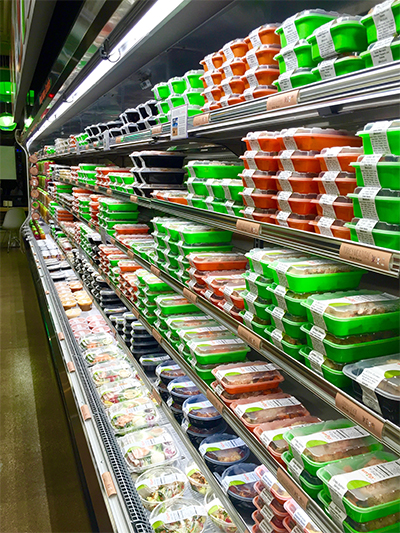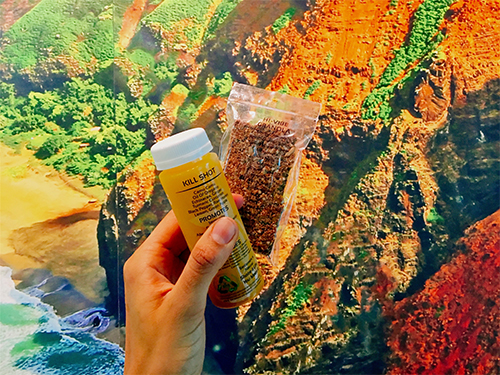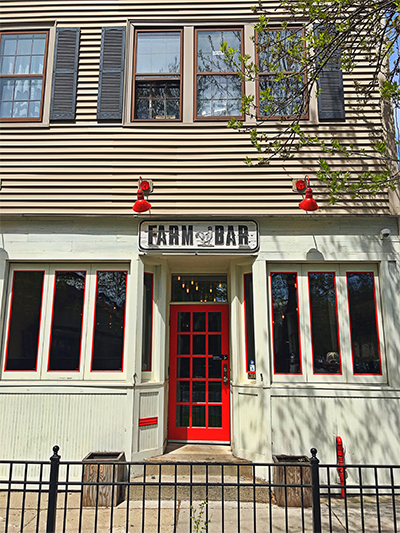Going paleo can be hard. It requires research, diligence, and usually a lot of home cooking. As a personal chef, paleo food blogger, and all-around health nut, I spend most of my days concocting new recipes without gluten, grains or dairy, but full of flavorful ingredients made from happily raised animals and locally grown produce. When it comes to eating out, however, all bets are off.
Ask most restaurants if they have any paleo-friendly dishes and they’ll usually look at you with confusion or disgust. That said, times are changing, and slowly but surely, we’re experiencing a resurgence of traditional cooking in America’s heartland.
If you too have been struggling to find a restaurant that will suit your needs for paleo-friendly meals, don’t stress. I’ve done a little research for you to find four delicious, community-minded restaurants in Chicago that would be happy to serve you.
Grange Hall Burger Bar
844 W. Randolph St., Chicago, 312-491-0844
Last summer, an Australian food blogger reached out to me on Instagram with a request. She was visiting Chicago on a tour across the U.S. and was looking to me for a good farm-to-table restaurant recommendation. I didn’t hesitate to answer: Grange Hall Burger Bar. Home of the grass-fed, grass-finished burger.
Though “grass-fed” is quickly becoming a buzzword to today’s foodie, what’s often left out of the conversation is how the meat was “finished.” Just because Bessie spent most of her life eating grass on the pasture doesn’t mean that’s how she ended it. Many farmers will “grain-finish” to fatten them up near the end of their life for optimal flavor and faster growth. This is not the case at Grange. All their beef is grass-fed and grass-finished.
Owner and Chef Angela Lee takes the adage “you are what you eat” to another level. She believes you are what you eat eats. Or in other words, what you feed the cow is what you feed yourself. “The reason we choose grass-fed beef started with the choice to feed our own family beef that was raised on grass and not corn, feed and antibiotics,” Lee says.
Besides the carefully vetted meats on the menu, they are also very accommodating to the gluten-free crowd. Sure, it’s a burger place, but they have a special order called The Michelle Burger that should make any paleo food-goer very happy. Instead of a burger on a bun, it encourages you to take any patty and slap it on a locally sourced, seasonally changing salad. No extra side salad charge. And no weak-looking iceberg, tomato plate. Ah. Beautiful.
Efforts like this have put this restaurant at the top of my list. And my beliefs about the integrity of the establishment were all confirmed when Lee told me how she likes to run her business. “Restaurant owners, in my opinion, should focus on the responsibility of feeding the public. The choices we make affect the livelihood of those who eat our food,” Lee says.
Not often a restaurant owner includes the health of her customers in her bottom line.
Snap Kitchen
Seven Chicago locations
When Snap Kitchen first arrived on my street, I literally jumped for joy. I had read about the chef-driven, sustainably prepared “fast food” joint months before and couldn’t wait to try it. I must admit, upon first walking in, I was slightly disappointed by the cold and sterile atmosphere. It’s not what I would call a sit-and-stay-a-while kind of place. In addition, the meals — though marketed as “made from scratch daily” — sit already prepared in large refrigerators along the walls. Not quite what I had in mind when I thought of grass-fed beef and organic produce.
All that said, the food itself is delicious. And as far as the ingredient list goes, this place is doing something that has never been done before. They are offering on-the-go meals free of vegetable oil, grains and gluten, and using meats and fish that are grass fed, free range and wild caught. These qualities are hard to find in even the fanciest of restaurants, never mind a quick on-the-go café.
Not all meals are 100 percent paleo, but each label is very clear about what’s inside. You’ll see a bulleted list labeling each dish that can include any of the following: Gluten-Free, Dairy-Free, Paleo and Vegan. They have everything from breakfast dishes (such as the Pulled Pork Biscuit and Gravy made with a grain-free paleo biscuit) and entrée meals (the Slow Roasted Brisket Tacos made with grain-free tortillas and topped with cashew crema is a personal favorite) to comforting side dishes (like Cauliflower Rice and Sweet Potato Mash). Oh! And let’s not forget dessert. Coconut macaroon made with organic shredded coconut? Yes, please. Of course, as any dutiful on-the-go place should, they have a wide array of drinks and snacks that include the likes of GT’s Kombucha, Nick’s Grass Fed Beef Stx and Caveman Quickies™ trail mixes.
So, once you look past the extremely bright lights, you’ll find well-made, nutritionally sound paleo convenience. A novel idea for the traditional foodist.
HI-VIBE Chicago
160 W. Kinzie St., Chicago, 312-724-VIBE
The first time I walked into HI-VIBE Organic Superfood Juicery on Kinzie Street (kitty corner to the Merchandise Mart), I immediately felt as though I’d been transported to Beverly Drive in Beverly Hills. There, superfood-based, health-conscious juice bars are nearly as popular as Starbucks. But in Chicago? Not quite as common.
No, HI-VIBE is not a restaurant, but it’s also more than just a juice bar. The menu features hot ticket items like bone broths, kale salads, superfood smoothies, acai bowls, and of course the newsworthy, and at times notorious, Bulletproof coffee.
Of all the items on the menu, the bone broth is what stopped me in my tracks on the way to work one blistery January morning. A big advocate for this collagen-rich, traditionally made golden tonic, you can usually find a batch simmering in my crockpot at home. However, I’ll be the first to admit that it can be a pain in the butt to make. If Chicago has finally jumped on the bone broth bar bandwagon, I am all in. Unfortunately, I have not once been able to experience it at HI-VIBE because every time I’ve been there, they are sold out! Apparently, 2 p.m. is too late to get in on their Activated Broth cups. Made with grass-fed beef and free-range chicken broth, and finished off with coconut oil, apple cider vinegar, turmeric, ginger, lime, sea salt, pepper, and the option to “make it hot” with cayenne, the stuff is so popular that people line up for it first thing in the morning (along with their equally thirsty Bulletproof coffee comrades).
If you’ve guessed that HI-VIBE might have steep prices, you’d be right. Their Acai Bowls cost $13.50, a Bulletproof Coffee is $9, and a simple snack like their Superfood Truffles are $15. But the HI-VIBE customer is very aware of the high cost of eating for optimal health, and they think it’s well worth it. One look at the morning rush hour line and you’ll see that for yourself.
Farm Bar
1300 W. Wellington Ave., Chicago, 773-281-2599
Of all the restaurants on this list, I had to make a special trip to visit Farm Bar. You see, I’d already frequented the other spots over the years, but Farm Bar had been lingering on my “restaurant to-dos” since its opening in November 2016.
I sat down with general manager Erik Wiseman and asked him to give me a short synopsis of where they source their ingredients. Happy to help, he got comfortable and literally took me through every item on the menu to give me a thorough answer. Without a cheat sheet in front of him, he spouted off that the grass-fed beef is from Strauss Farms, the antibiotic and hormone-free chickens are from a collection of nearby Amish farms, the humanely-raised lambs are from Catalpa Grove Farm, the cocktail and garnish ingredients are from the owner’s very own Brown Dog Farm, and their free-range eggs are from Chuck, “the egg man” (yes, that is actually what they call him).
When it comes to their animals, Wiseman puts it this way: “They’ve just had one sh*tty day.”
He insists that the rest of their life they’ve been treated with love and respect. Not surprising considering everything about the restaurant — from their reclaimed wood barn-like exterior, to their black walnut bar top, made of a tree grown on the owner’s farm — screams Midwest values.
Before I let him go, I had to ask Wiseman one more very important question that any discerning paleo person wants to know: What kind of oil do you use?
Expecting the typical “canola oil” response, I was pleasantly surprised to hear him say that they use olive oil as much as possible. In a world where most restaurants are happy to cut costs with factory-made vegetable oils, finding one that is willing to spend the extra dollar on a cold-pressed, more nutritionally sound option is a welcome discovery.
On the walk back to our car, my husband and I were chatting about the rarity of a place like Farm Bar. Sure, the farm-to-table concept is the cool new kid on the block, but it’s easy to slap a label on your just-opened eatery to attract attention. What’s difficult is to hold yourself up to a higher standard and put your customer’s health — and local farmers — in mind first. They do the things nobody else is doing, not as a marketing ploy, but because, to them, it matters. My husband put it perfectly when he said, “The hardest part is that there is no guarantee that this approach won’t fail. They just have to hope that other people care as much as them.”
I’m going to bet that they do.
Photos by @healthystaceyblog.




